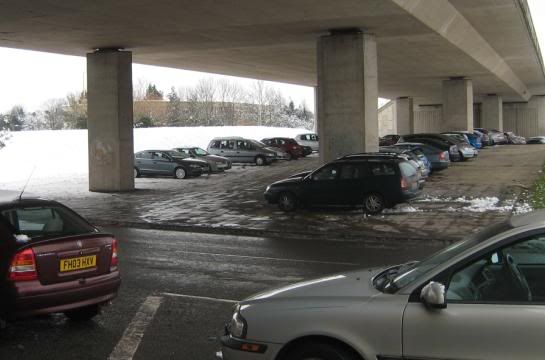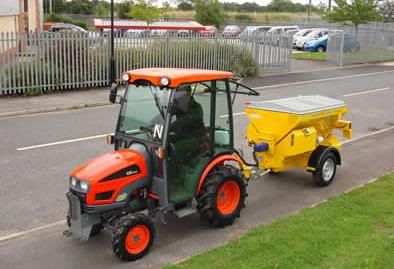Very high numbers of people in the town centre Christmas shopping. When the severity of the weather became apparent most tried to leave during a very short space of time, resulting in queues to get out of all town centre car parks and extraordinarily high volumes of traffic on the town’s highway network. Retailers receiving information about the weather and sending staff home, adding to the sudden influx of cars onto the network from the car parks and traffic diverting from other networks.
Other roads (outside the borough such as the M40) and bridges across the Thames (such as Sonning Bridge) were closed or only open to restricted traffic resulting in significant diversion onto Reading’s roads and bridges. Conditions deteriorated very rapidly and traffic came to a standstill on most roads trapping the gritting lorries within the congestion and preventing them completing their gritting runs.
Significant numbers of people were “trapped” in vehicles and stationary for significant times. Many people managed to get to friends relatives or colleagues and spend the night there and in most of these situations vehicles were “left” in accessible places and returned to the following day.
By midnight most traffic had moved on or parked up for the night. However a significant amount of vehicles were abandoned in circumstances that led to roads being blocked. At 5am there were approximately 267 vehicles abandoned on the A33 between Vastern Road and Bennet Road with many other vehicles also abandoned throughout the Reading highway network.

This is the London Road A3290 roundabout, full of parked cars.
In response to the emerging situation during the course of the late afternoon of 21 December 2009, when the extent and severity of the conditions and their implications across the town were anticipated, officers instigated the Emergency Plan and operations centre and put in place a range of measures from 5.30pm throughout the night.
Tuesday 22 December 2009 weather forecast was for continuing freezing conditions but no further snow fall. People coming into the town centre faced very icy conditions. Staff from parks, streetcare and highways were brought in to hand (with shovels) grit the town centre. Police and Council staff were co-ordinated and targeted blocked roads where abandoned vehicles were cleared and the roads reopened. By the afternoon most bus services were able to run on a limited basis. Most bus services were able to run but not all routes could be served until towards the end of the day. The availability of grit became an issue and highways reserved all their supplies for the primary and secondary roads network.
Members of the public across the town made a significant contribution to the clearing of snow and providing support to those in greatest need through their own, largely self-directed, local activities.
The Emergency Centre was formally established at 5.30pm on Monday the 21 December 2009 and was staffed by designated officers from services across the Council. This centre was staffed until 2.00am on Tuesday 22nd and dealt with calls from the public, liaison with the police, highways agency, neighbouring authorities and local media. The centre was able to continually monitor the traffic conditions on the roads using the traffic cameras already in place.
The Chief Executive, with representatives of West Berkshire and Wokingham in contact by phone, attended the police silver command meetings that were held at 6.30, 7.30 and 9pm on 21 December 2009, to coordinate responses and procedures throughout the affected Thames Valley area.
Several centres were set up to provide overnight accommodation for those stranded in the centre by the weather. Where more vulnerable people required assistance a number of 4x4 vehicles were used to transport people safely to their homes.
Before the emergency centre was closed a discussion and plan of action for the ongoing conditions needing to be addressed on Tuesday 22nd December was held. The Emergency Operations Centre was initiated again on the afternoon of 5 January 2010 when the forecast of severe weather was received. It has remained operational, with a rolling shift of relevant officers, throughout the period of the poor conditions and into the ‘recovery phase’, as services began to resume normal operations.
As with all other authorities our policies do not cover footways outside the pedestrianised town centre area. This is standard practice for two reasons, logistics and costs. Gritting of footways can only be done manually and is both time and resource intensive: even deploying most highways, street care and parks staff it would still take up to a week to grit all the footways in Reading and the costs would be significant. Some work is being carried out on the costs and targeting of additional gritting and this will be included in later reports. Some other highly-used pedestrian routes were gritted during this exceptional period, such as Caversham and Reading Bridges. We also had the use of a “mini digger” for the Duke Street scheme which proved very useful for clearing pedestrian routes in and around the town centre.
The provision and location of grit bins were an issue during this period. Grit bins had been relocated during the autumn as a result of the policy review with bins on gritting routes being removed as they were no longer needed and new bins located in areas where a need had been established. Unfortunately although the grit is provided for the public highway it is not always retained for this use and the ongoing cost of providing and replenishing the bins is significant.
The supply of grit/salt/urea held by the highways section is only for use when carrying out the Council’s statutory duty of maintaining the public highway. Supplies are always limited by availability and cost.
It is a great shame that all the authorities efforts were focused on getting the roads fixed, it was easier to drive from one end of the country to the other than for a pensioner with no car to walk to the shops. There seems to be no interest in gritting footpaths, even ones by shops. Clearly to have every footpath in towns cleared by people with shovels is a huge task. Perhaps we need some cycle powered gritters. This tractor powered gritter looks small enough.

In the meantime I would add to the priorities the paths near all shops. Among others many elderly and disabled people would have a read problem during this period. Some people shovelled snow from the road onto the footpath!
The council didn't seem interested in looking at gritting stocks. Gordon Brown said grit stocks for a winter 'the recommendation of six days supply was "best practice" decided by experts', but this must be increased.
The local bloggers responses on the 21st December varied enormously. The Tories Cllr Willis said 'It seems that the snow caught our local highways team on the hop as there was no obvious gritting or salting on even the main roads.' And afterwards 'What we need now is a considered investigation into the circumstances leading to yesterday’s severe weather and the Council’s reaction.' Reading East MP Rob Wilson was critical, but Wokingham's John Redwood called the reponse to the extreme conditions 'pathetic'.
The LD did point to some problems, such as buses not running. They were very quick to blame the council. They printed twitters from angry residents. Not a word about the exceptional conditions, or how council employees were working hard. And they want grit bins to be used by residents 'the Council should look to put in place facilities to enable residents to help themselves during snowy and icy weather. i.e more grit bins'
On BBC Radio Berks LD Cllr Pru Bray "heard Martin Salter (Labour MP) praise Reading council (Labour) for its efforts (and the rest of the public services) whilst this morning Rob Wilson (Tory MP) attacked it for not doing enough. Funny that."
Labours Cllr Enis refers to the public stealing grit! And 'media stories about the threat of being sued if someone were to fall on the path that was cleared of snow by a resident.'
Meanwhile Howard Thomas offers some 'common sense' opinion that it is "nothing short of a disgrace that our council are either incapable or unwilling to do their duty."






2 comments:
The council give the excuse that they had only 30 minutes warning of the bad weather.........but unfortunately this doesn't really add up because we had snow a few days previously and their response was equally bad. The roads were already in a bad condition due to a lack of gritting. There would still have been major problems , but it need not have been as severe as it was.
I should have mentioned the report in my own blog, http://greenreading.blogspot.com/2009/12/snow-chaos-in-reading.html
Police tips include: unless it is absolutely essential you are strongly advised not to travel, do not abandon your vehicles on the highway as this prevents emergency services and gritting vehicles getting through, and only call the emergency services in a real emergency.
Situations like this tend to bring out the bast in people, from council and hospital staff working long hours, to ordinary people helping those in need. BBC Radio Berkshire and other news services have been praised for their work keeping people informed.
Post a Comment